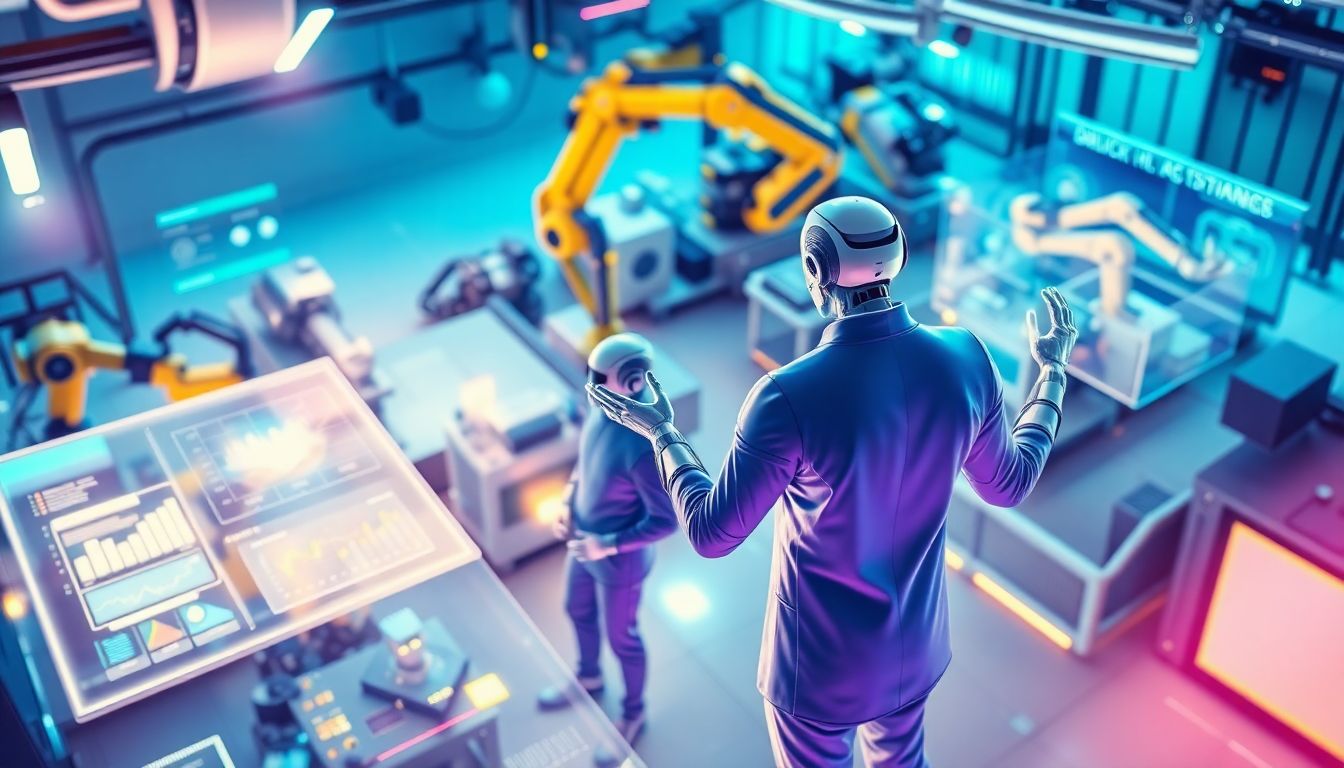- Get link
- X
- Other Apps
- Get link
- X
- Other Apps

Did you know that up to 30% of workplace tasks could be automated? But many businesses still struggle with old-fashioned ways to get things done. Manual work and slow systems bog down productivity. This is where AI agents step in, offering a powerful fix. They're not just another tool, but a real shift in how work gets done. AI agents can handle tasks, learn, and adapt, which boosts how efficient and effective your workplace is.
Understanding AI Agents and Their Capabilities
AI agents are the new brains of workplace automation. They bring a fresh twist to handling tasks. Let's explore what they are and what makes them special.
What are AI Agents?
AI agents are smart programs. They can act on their own to achieve goals. They're designed to perceive their environment, make decisions, and take action.
Key traits make them stand out. Autonomy lets them work without constant help. Learning allows them to improve from experience. Adaptability means they adjust to new situations. These features make AI agents perfect for today’s work challenges.
AI Agents vs. Traditional Automation
How do AI agents differ from old-school methods? Traditional automation, such as RPA, follows fixed rules. AI agents, however, think and learn.
Think of it this way: RPA is like a robot that repeats steps. AI agents are like smart assistants who understand and solve problems. AI agents use things like natural language processing. They also utilize machine learning to handle complex tasks.
Use Cases: How AI Agents Are Transforming Workflows
AI agents are not just a concept. They're changing how different departments operate. Here are a few ways they're making a real difference.
Customer Service Automation
Imagine a world where customer questions are answered instantly. AI agents make this happen. They power chatbots and virtual assistants. These tools handle inquiries, solve problems, and personalize interactions.
This means faster service and happier customers. Isn't that what every business wants?
Streamlining Data Entry and Processing
Data entry can be a real drag. AI agents automate this, which saves time and reduces mistakes. They extract, check, and process data from different sources.
AI uses Optical Character Recognition (OCR). This technology reads text from images and documents. Intelligent document processing takes it a step further. It understands the content and sorts it automatically.
Optimizing Supply Chain Management
Supply chains are complex. AI agents can help manage inventory, forecast demand, and optimize logistics.
They monitor everything in real-time. They can also predict when machines need maintenance. This helps to avoid delays and keep costs down.
Benefits of Implementing AI Agents in the Workplace
Why should you use AI agents? The benefits are clear. It boils down to greater productivity, reduced costs, and happier employees. Let's explore each.
Increased Efficiency and Productivity
AI agents speed up task completion. They also improve how much you can produce. They minimize errors and boost accuracy.
For example, an AI agent can process invoices five times faster than a person. This frees up employees to focus on other important things.
Reduced Costs and Operational Expenses
Labor costs can be a major expense. AI agents minimize these costs. They also optimize how you use resources and reduce waste.
Implementing AI offers a solid return on investment (ROI). It streamlines processes and cuts down on errors. This can lead to substantial savings.
Improved Employee Satisfaction and Engagement
No one likes doing boring tasks. AI agents take these off your plate. This lets employees focus on creative and strategic work.
It also creates opportunities for upskilling. Employees can learn new skills and take on more challenging roles.
Challenges and Considerations for AI Agent Adoption
Like any new technology, there are hurdles to implementing AI agents. Let’s discuss data security, system integration, and ethics.
Data Security and Privacy Concerns
Protecting data is key. Make sure you follow rules like GDPR and CCPA. Use encryption to keep data safe. Control who can access what. Also, consider anonymizing data to protect people's privacy.
Integration with Existing Systems
Linking AI agents with older systems can be tricky. It also poses challenges with cloud platforms. Develop strategies for smooth integration and data transfer. Plan out data migration to make sure things run smoothly.
Ethical Considerations and Bias Mitigation
AI agents can sometimes make unfair decisions. It's important to make sure that AI is fair and transparent. Always ensure you take responsibility for how AI agents work.
Future Trends in AI Agent Technology
The world of AI is always changing. Let's look at the future and what’s next.
Hyperautomation and Intelligent Automation
Hyperautomation links AI agents with other automation tools. Think about RPA and Business Process Management (BPM). This creates complete automation.
The goal is to automate processes from beginning to end. AI becomes a key part of how everything works.
AI-Powered Decision Making and Predictive Analytics
AI agents are becoming more important for making decisions. They forecast future trends. Machine learning models and predictive algorithms help with this. Businesses can use these insights to plan and make smart choices.
Conclusion
AI agents are changing workplace automation for the better. They boost efficiency, cut costs, and improve employee satisfaction. While there are challenges to adoption, the benefits outweigh them. The future of AI agents looks bright. Embracing this tech now can give your business a real edge. Take the first step and explore how AI agents can transform your work processes.
- Get link
- X
- Other Apps
Comments
Post a Comment